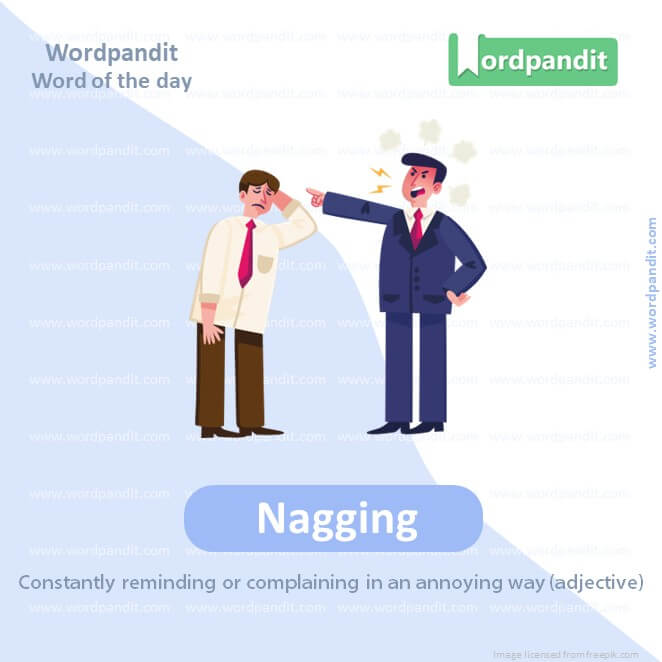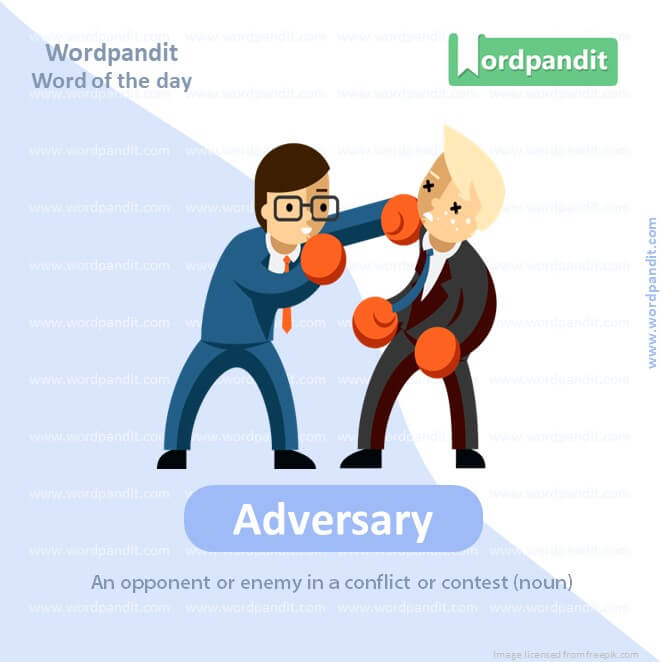Daily Vocabulary Words: List of Daily Used Words in Leading Indian Newspapers
Hi there. Welcome to this special section @ Wordpandit. Our endeavour here is straightforward: highlighting daily vocabulary words that you would come across in leading newspapers in the country. We have included the following newspapers in our selection:
• The Times of India
• The Economic Times
• Hindustan Times
• Mint
• Indian Express
We are putting in extensive work to develop your vocabulary. All you have to do is be regular with this section and check out this post daily. This is your repository of commonly used words; essentially, we are posting a list of daily used words. Hence, this has significant practical application as it teaches you words that are commonly used in leading publications mentioned above.
Visit the website daily to learn words from leading Indian newspapers.
WORD-1: Synchronised
CONTEXT: It is also to be synchronised with the local body polls as both these elections are conducted by separate and independent constitutional/statutory authorities.
SOURCE: Hindustan Times
EXPLANATORY PARAGRAPH: When things happen at the same time or in harmony with each other, it’s called synchronized. It’s like when dancers move together in a dance performance.
MEANING: Happening at the same time or in harmony with each other (adjective).
PRONUNCIATION: SIN-kruh-nized
SYNONYMS: coordinated, simultaneous, aligned, harmonized, concerted
USAGE EXAMPLE:
1. The dancers performed a synchronized routine.
2. The team’s movements were perfectly synchronized.
3. Synchronized swimming requires precise coordination.
4. The music and lights were synchronized for the show.

WORD-2: Nagging
CONTEXT: The way forward lies in building consensus for investing in infrastructure and technology, which could take care of a number of nagging issues that would remain even if the Kovind Committee recommendations are implemented.
SOURCE: Hindustan Times
EXPLANATORY PARAGRAPH: When someone keeps reminding you or complaining in an annoying way, it’s called nagging. It’s like when your parents keep telling you to clean your room.
MEANING: Constantly reminding or complaining in an annoying way (adjective).
PRONUNCIATION: NAG-ing
SYNONYMS: pestering, annoying, persistent, repetitive, bothersome
USAGE EXAMPLE:
1. Her nagging about the chores irritated her siblings.
2. He grew tired of his boss’s constant nagging.
3. The nagging sound of the dripping faucet was annoying.
4. Nagging doubts kept creeping into his mind.
WORD-3: Seemingly
CONTEXT: When it comes to American politics and its impact on India, here are four seemingly contradictory features that are simultaneously true.
SOURCE: Hindustan Times
EXPLANATORY PARAGRAPH: When something appears to be true or real but may not actually be so, it’s called seemingly. It’s like when a magic trick looks real but is just an illusion.
MEANING: Appearing to be true or real but possibly not (adverb).
PRONUNCIATION: SEE-ming-lee
SYNONYMS: apparently, evidently, seemingly, purportedly, ostensively
USAGE EXAMPLE:
1. The solution to the problem was seemingly simple.
2. She was seemingly happy, but there was sadness in her eyes.
3. The company’s success was seemingly unstoppable.
4. Seemingly innocent actions can sometimes have big consequences.

WORD-4: Adversary
CONTEXT: Biden was smart in carrying forward the one important rupture from the Trump years of viewing China as an adversary and waking up to the limits of engagement.
SOURCE: Hindustan Times
EXPLANATORY PARAGRAPH: When someone or something opposes or fights against you, it’s called an adversary. It’s like when you play a game and compete against an opponent.
MEANING: Someone or something that opposes or fights against you (noun).
PRONUNCIATION: AD-vuhr-ser-ee
SYNONYMS: opponent, enemy, rival, antagonist, foe
USAGE EXAMPLE:
1. He saw his competitor as his main adversary in business.
2. The superhero’s adversary was a powerful villain.
3. Adversaries in politics often clash over policies.
4. Overcoming his inner adversary was his biggest challenge.

WORD-5: Autonomous
CONTEXT: That was fine, for a friendly but relatively autonomous Delhi with credibility in the Global South was still better than Beijing.
SOURCE: Hindustan Times
EXPLANATORY PARAGRAPH: When something or someone can operate independently or without outside control, it’s called autonomous. It’s like when a robot can move on its own without being controlled by a person.
MEANING: Able to operate independently or without outside control (adjective).
PRONUNCIATION: aw-TAH-nuh-muhs
SYNONYMS: independent, self-governing, self-reliant, sovereign, self-sufficient
USAGE EXAMPLE:
1. The new drone has autonomous navigation capabilities.
2. The region declared itself an autonomous territory.
3. Autonomous vehicles can drive without human intervention.
4. The company operates as an autonomous division.
WORD-6: Gratuitous
CONTEXT: The American commentary may be gratuitous and counterproductive but to see it as some deep state conspiracy to destabilise Indian politics is a complete misreading.
SOURCE: Hindustan Times
EXPLANATORY PARAGRAPH: When something is given or done without a reason or payment, it’s called gratuitous. It’s like when someone gives you a gift just because they want to, not because it’s your birthday.
MEANING: Given or done without a reason or payment (adjective).
PRONUNCIATION: gri-TYOO-i-tuhs
SYNONYMS: unnecessary, unwarranted, unjustified, uncalled-for, gratuitous
USAGE EXAMPLE:
1. His comments about her appearance were gratuitous and offensive.
2. The movie had gratuitous violence that didn’t contribute to the plot.
3. She received a gratuitous bonus for her hard work.
4. The criticism was gratuitous and hurtful.

WORD-7: Fidelity
CONTEXT: Donald Trump’s areas of interest are narrow — and they obviously don’t include the state of religious minorities or the robustness of an electoral system, fidelity to liberal constitutionalism, the nature of a democracy or the absence of checks on executive authority in any other country.
SOURCE: Hindustan Times
EXPLANATORY PARAGRAPH: When someone is loyal and faithful to a person, belief, or duty, it’s called fidelity. It’s like when a dog is loyal to its owner and always stays by their side.
MEANING: To capture or trap someone or something
PRONUNCIATION: fuh-DL-i-tee
SYNONYMS: loyalty, faithfulness, allegiance, devotion, constancy
USAGE EXAMPLE:
1. Their marriage was based on trust and fidelity.
2. She showed fidelity to her principles despite criticism.
3. Fidelity to the company’s values was important to him.
4. The soldier’s fidelity to his country was unwavering.

WORD-8: Evangelicals
CONTEXT: Trump will be susceptible to evangelicals or when Trump wants to extract something from India on another front.
SOURCE: Hindustan Times
EXPLANATORY PARAGRAPH: Evangelicals are people who follow a Christian religious movement that emphasizes preaching and spreading the teachings of the Bible. It’s like a group of people who are very passionate about sharing their beliefs.
MEANING: Followers of a Christian religious movement emphasizing preaching and spreading biblical teachings (noun).
PRONUNCIATION: ee-van-JEL-i-kuls
USAGE EXAMPLE:
1. Many evangelicals are active in missionary work.
2. Evangelicals believe in the importance of spreading the gospel.
3. The church has a strong community of evangelicals.
4. Evangelicals gather for worship and fellowship.
WORD-9: Irritant
CONTEXT: an America that sees its global obligations as an irritant suits Beijing just fine, for who else is best positioned to fill the ensuing vacuum in much of the world.
SOURCE: Hindustan Times
EXPLANATORY PARAGRAPH: When something annoys or bothers you, it’s called an irritant. It’s like when a mosquito buzzes around your ear and won’t leave you alone.
MEANING: Something that annoys or bothers (noun).
PRONUNCIATION: IR-i-tuhnt
SYNONYMS: annoyance, nuisance, bother, pest, inconvenience
USAGE EXAMPLE:
1. The constant noise outside became an irritant.
2. Her criticism was seen as an irritant by her colleagues.
3. Dealing with technical issues was a major irritant.
4. The irritant caused frustration among the team.
WORD-10: Turbulent
CONTEXT: Trump 2.0 will leave the world even more turbulent and will demand far more from Indian diplomacy, a prospect that should worry Delhi.
SOURCE: Hindustan Times
EXPLANATORY PARAGRAPH: When something is chaotic, disorderly, or full of conflict and unrest, it’s called turbulent. It’s like when a storm causes strong winds and rough seas.
MEANING: Chaotic, disorderly, or full of conflict and unrest (adjective).
PRONUNCIATION: TER-byuh-luhnt
SYNONYMS: chaotic, stormy, unsettled, tumultuous, agitated
USAGE EXAMPLE:
1. The country experienced turbulent times during the revolution.
2. The company faced turbulent market conditions.
3. Their relationship was turbulent and filled with arguments.
4. The turbulent weather delayed flights and caused disruptions.
Vocabulary English Grammar
Delving into the vast universe of language learning, the ‘Vocabulary English Grammar’ acts as a beacon, illuminating the path to mastery. This synergy of words and rules forms the quintessential framework of the English language. However, understanding ‘Vocabulary English Grammar’ in-depth requires a fine-tuned strategy.
First and foremost, understanding ‘Vocabulary English Grammar’ goes beyond only remembering rules and words. It involves learning how a word functions in a grammatical context. To achieve this, resources like textbooks, online grammar guides, and interactive language learning apps prove to be very valuable.
However, embracing ‘Vocabulary English Grammar’ calls for consistent practice. Adopting thematic learning, where you concentrate on a specific grammatical concept and the vocabulary related to it, can be particularly effective. Reading material like articles and books, or engaging with podcasts and films can provide a real-world context to these concepts.
The key to mastering ‘Vocabulary English Grammar’ lies in constructing sentences. Instead of memorizing disconnected words and rules, start framing sentences. This active application significantly bolsters comprehension and provides practical insight into how grammatical rules govern the use of words.
To truly excel in ‘Vocabulary English Grammar’, it’s important to seek feedback. Participate in language exchange platforms or conversation clubs. These platforms provide an opportunity to apply what you’ve learned and obtain constructive feedback on your progress.
In essence, understanding ‘Vocabulary English Grammar’ is a step-by-step process that requires thoughtful learning, constant practice, application, and proactive feedback. By embedding these techniques into your language learning routine, you can confidently navigate ‘Vocabulary English Grammar’. Remember, mastering ‘Vocabulary English Grammar’ is not about perfection, but about progression and communication. Each rule learned, each word comprehended, brings you closer to the fluency in your English language journey.













